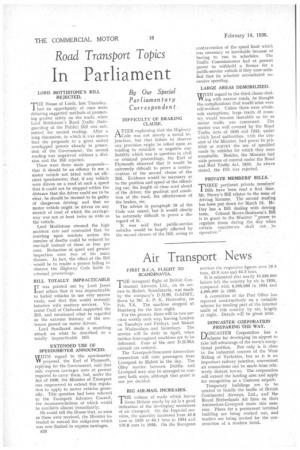Road Transport Topics
Page 36

If you've noticed an error in this article please click here to report it so we can fix it.
In Parliament
By Our Special Parliamentary Correspondent
LORD MOTTISTONE'S BILL REJECTED.
THE House of Lords, last Thursday, had an opportunity of once more debating suggested methods of promoting greater safety on the roads, when Lord Mottistone's Road Traffic (Safeguarding of the Public) Bill was submitted for second reading. After a long discussion, in which it was show n that the proposals to a great extent overlapped powers already in possession of the Government, the second reading was negatived without a division and the Bill rejected, There were three main proposals— that it should be an offence to use a motor vehicle not fitted with an efficient speedometer; that, if any vehicle were driven on a road' at such a speed that it could not be stopped within the distance that the driver could seato.be clear, he should be deemed to be guilty of dangerous driving; and that no motor vehicle might be driven on any stretch of roa,d of which the carriageway was not at least twice as wide as the vehicle.
Lord Mottistone stressed the high accident rate and contended that by insisting upon resolute action the number of deaths could be reduced by one-half instead of three or four per cent. Reduction of speed and greater inspection were two of his main themes. In fact, the effect of the Bill would be to render a person failing to observe the Highway Code liable to criminal proceedings.
BILL TOTALLY IMPRACTICABLE I T was pointed out by Lord Jessel and others that it was impracticable to forbid vehicles to use very narrow roads, and that this would seriously interfere with sanitary services, Viscount Cecil of Chelwood supported the Bill, and mentioned what he regarded as the extreme leniency of the sentences passed on motor drivers.
Lord Sandhurst made a searching attack on what he described as a totally impracticable Bill.
EXTENDED USE OF SPEEDOMETER ANNOUNCED.
WITH regard to the speedometer VV proposal, the Earl of Plymouth, replying for the Government, said that only express carriages were at present required to carry them, but, under the Act of 1930, the Minister of Transport was empowered to extend this regulation to apply to motor vehicles generally. This question had been referred to the Transport Advisory Council, the recommendations of which would be available almost immediately.
He could tell the House that, so soon as these were received, the Minister intended to extend the obligation which was now limited to express carriages.
B26 DIFFICULTY OFBRAKING CLAUSE.
A RTER explaining that the Highway PICode was not merely a moral injunction, but that failure to observe any provision might be relied upon as tending to establish or negative any liability which was in question in civil or criminal proceedings, the Earl of Plymouth observed that it would be extremely difficult to prove a contravention of the second clause of the
Evidence would be necessary as to the position and speed of the offending car, the length of clear road ahead of the driver, the gradient and condition of the road, the effectiveness of the brakes, etc.
The advice in paragraph 10 of the Code was sound, but it would clearly be extremely difficult to prove a disregard of it.
It was said that public-service vehicles would be largely affected by the second clauses of the Bill, owing to contravention of the speed limit which was necessary or inevitable because of having to run to schedules. The Traffic Commissioners had at present power to withhold a licence for a public-service vehicle if they were satisfied that its schedule necessitated excessive speeding.
LARGE AREAS DEMOBILIZED.
WITH regard to the third Clause dealVV leg with narrow roads, he thought the complications that would arise were self-evident. Unless there were wholesale exemptions, large tracts Of country would become immobile so far as motor traffic was concerned. The matter was well covered by the Road Traffic Acts of 1930 and 1933, under which local aiitherities, with the Consent of the Minister, had power -fa pthhibit or restrict the use of specified roads by vehicles for which they were unsuitable. Besides, the Minister. had wide powers of control under the Road and Rail Traffic Act, 1933. As above stated, the Bill was rejected.
PRIVATE MEMBERS' BILLS.
THREE pertinent private members' Bills have been read a first. time. Mr. Storey's Bill relates to the issue of driving licences. The second reading has been put down for March 13. Mr. Day has a Bill dealing with driving tests.. Colonel Moore-Brabazon's Bill is to grant to the Minister "lower to regulate times during the day when certain enactments shall net ..= be opera tive ."




















































































